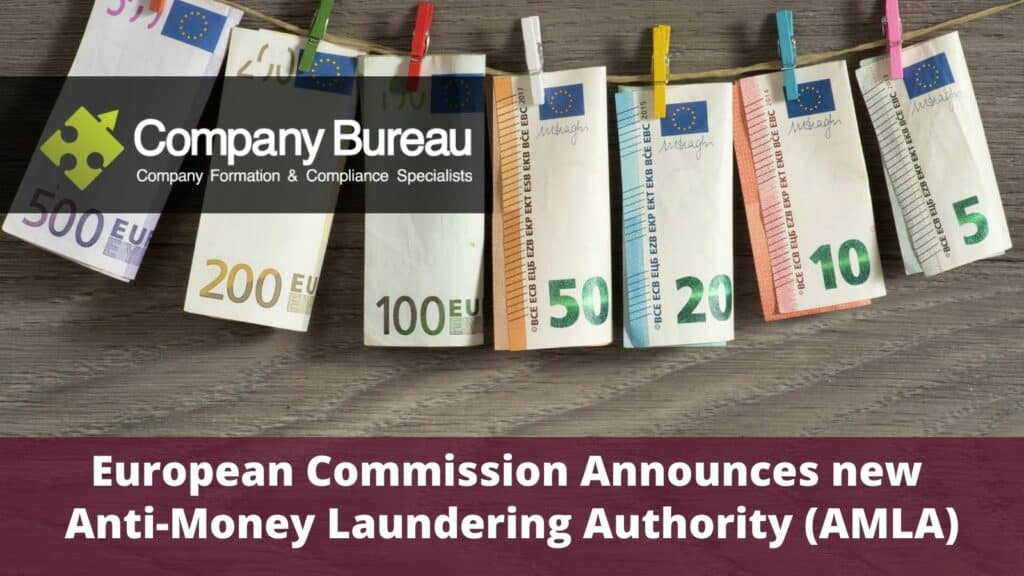By Sarah Dixon, 9th August 2021
The European Commission has announced plans to establish a new Anti-Money Laundering Authority (AMLA) to tackle money laundering and terrorist financing across Europe. This announcement comes in response to several major banks across Europe being hit with money laundering scandals. An estimated €1.87 trillion worth of dirty money passes through European Banks annually. The announcement coincides with the European Union’s 6th AML Directive which must be implemented by financial institutions and regulated entities by 3rd June 2021.
The European Parliament and member states are working to create a single EU rule book for anti-money laundering and the countering of terrorist financing, which includes rules on crypto assets. The new Anti-Money Laundering Authority (AMLA) is expected to set up operations in 2024. From 2026, the authority will be able to directly supervise some cross-border financial companies and levy fines of 10% of annual turnover, no higher than €10 million.
Issues with current EU AML Legislation
Despite the various EU AML directives, money laundering remains a major problem in the European Union. Europol estimates that 1.3% of the EU’s economic activity involves suspicious transactions. The efforts to combat money laundering in the EU have been hampered due to inconsistent enforcement practices within member states as well as a reluctance from some countries in fully implementing the EU AML legislation.
Call for more stringent EU AML Legislation
Given recent bank attacks and the continually evolving nature of how finances and assets are transferred, there is a clear need for major reform in the EU’s current legislation. Regular revision of EU AML legislation is necessary to combat the rise in laundering illegally obtained finances. The creation of a new central entity, the Anti-Money Laundering Authority signals that the European Commission is not confident in the effectiveness of the patchwork of regulation by member state authorities. Currently, each member state holds some discretion in how they meet EU AML requirements and many member states have failed to implement current EU AML legislation into their national laws. The AMLA aims to provide an intergovernmental approach to AML. This new AML agency will be a supranational body that will supervise and monitor AML across all of Europe. Each EU member state will be answerable to the AMLA agency in an effort to impose more rigid legislation.
The focus of the proposed 6th AML Directive
The new proposal has a major focus on cryptocurrency – an asset transfer phenomenon that was first created in 2009 and has since grown to be one of the largest investment vehicles today. The Anti-Money Laundering Authority will attempt to create better legislation surrounding cryptocurrency. The new plan will require all cryptocurrency providers to verify the identity of those sending and receiving transactions. The idea behind this is that once the anonymity is gone, suspicious transactions can be tracked more easily. The fight against money laundering has been a key part of the EU’s legislative agenda since the first AML Directive was adopted in the early ’90s – since then, however, cryptocurrency has become an integral part of the business world. EU legislation and directives urgently need to catch up on how rapidly cryptocurrency has grown and evolved.
Despite this being the first major overhaul in EU wide AML legislation, it appears that the European Commission is not overly concerned with every aspect of money laundering. The published framework seems mainly concerned with financial services money laundering and cryptocurrency. Although it briefly mentions gambling controls and that each member state ought to regulate gambling services, it gives little more insight to gambling than that. Interestingly, the proposal doesn’t mention diamond dealers or art dealerships or other businesses that are high risk in terms of cash-flow. Although cash transactions over €10,000 are to be banned under the proposal.
Conclusion
Given the regular uncovering of money laundering schemes, the new proposal should be welcomed. However, the uptake of AML legislation in the EU is notoriously slow – with 23 of 27 member states being investigated by Brussels for failing to implement the previous 2 AML directives.
The EU has said it is aiming to have the new Agency fully staffed and running by 2026, provided each of the 27 member states agree.
If you have any queries about the new Anti-Money Laundering Authority or how EU AML legislation may affect your business, please do not hesitate to contact us or call +353 1 6461625.
Disclaimer This article is for guidance purposes only. It does not constitute legal or professional advice. No liability is accepted by Company Bureau for any action taken or not taken in reliance on the information set out in this article. Professional or legal advice should be obtained before taking or refraining from any action as a result of this article. Any and all information is subject to change.
